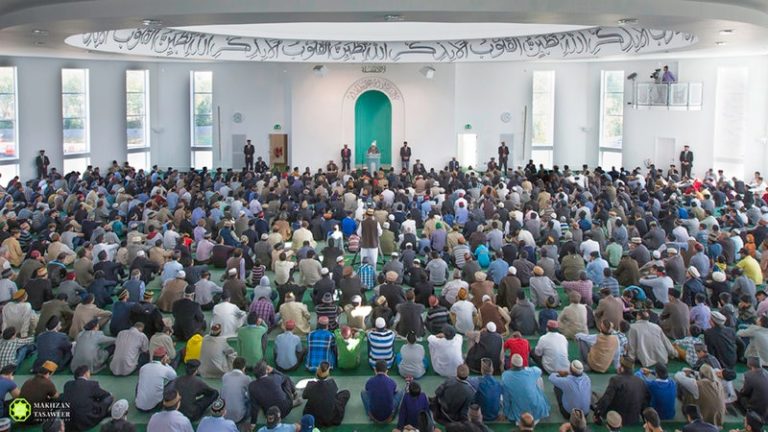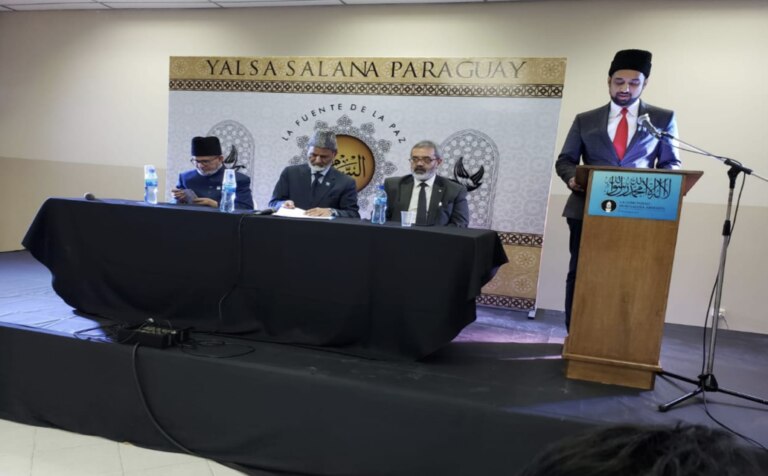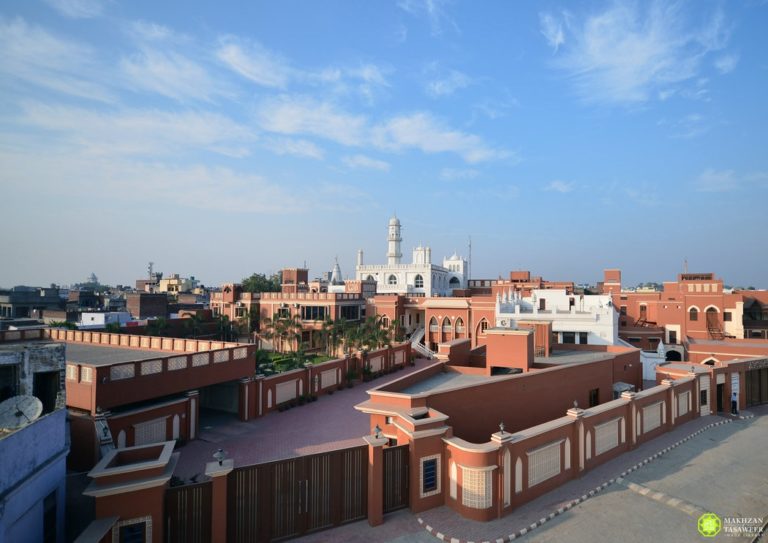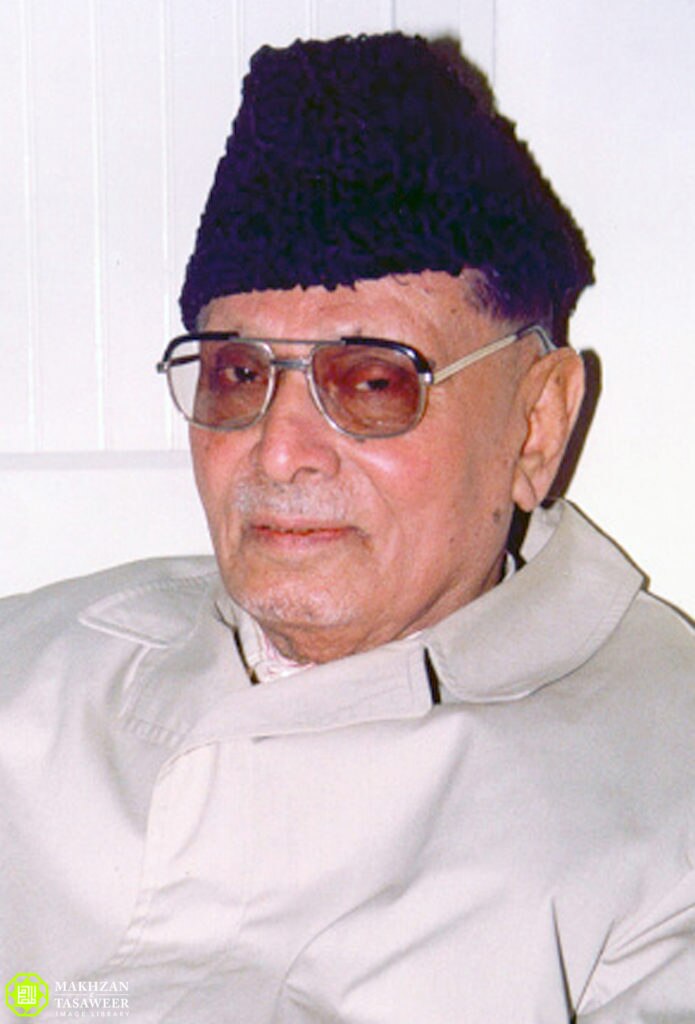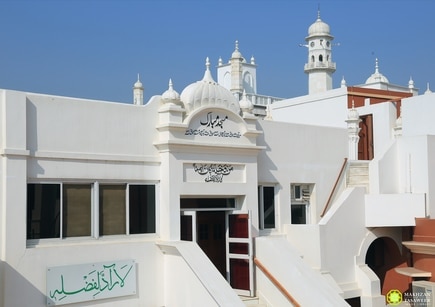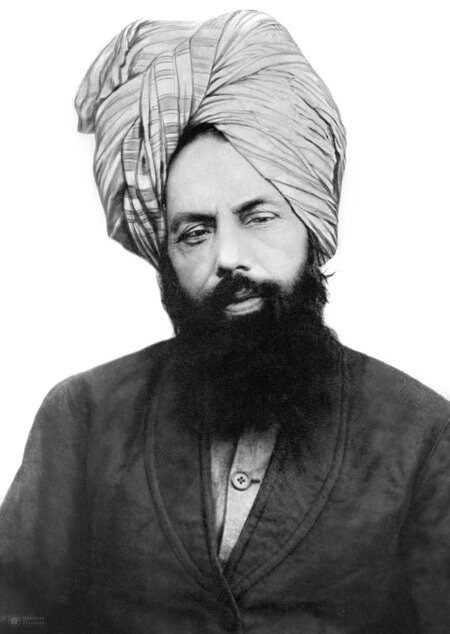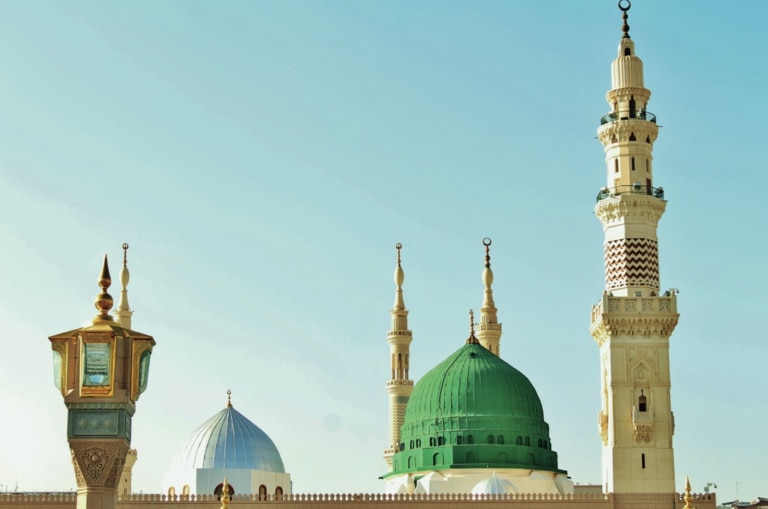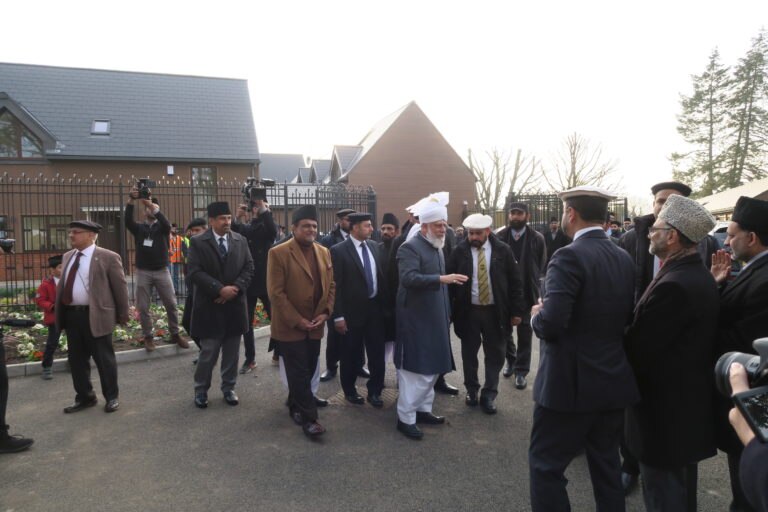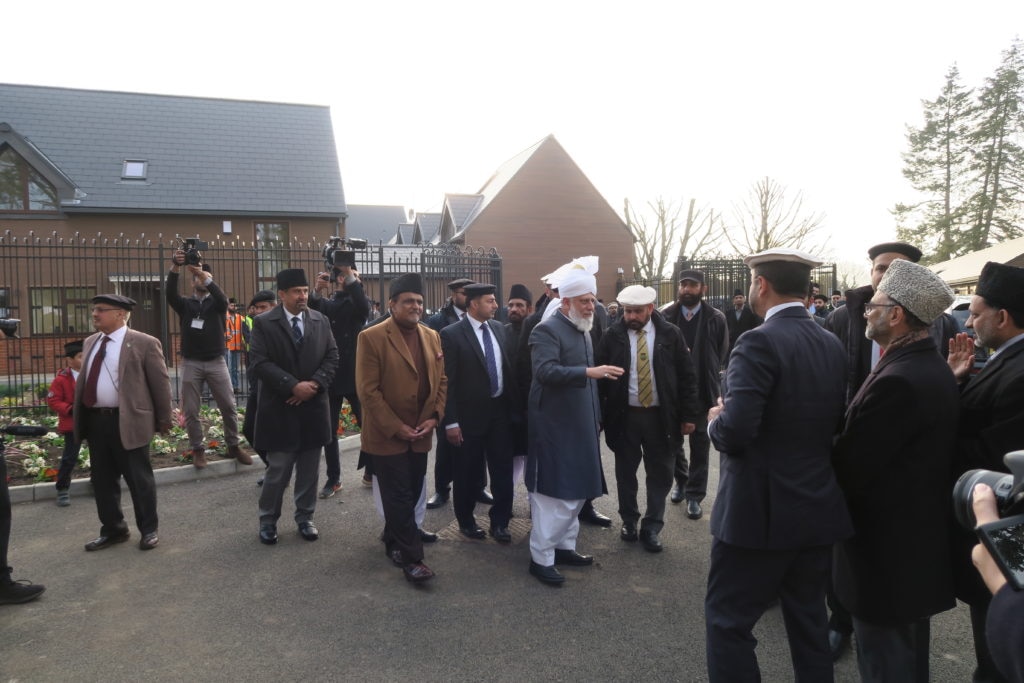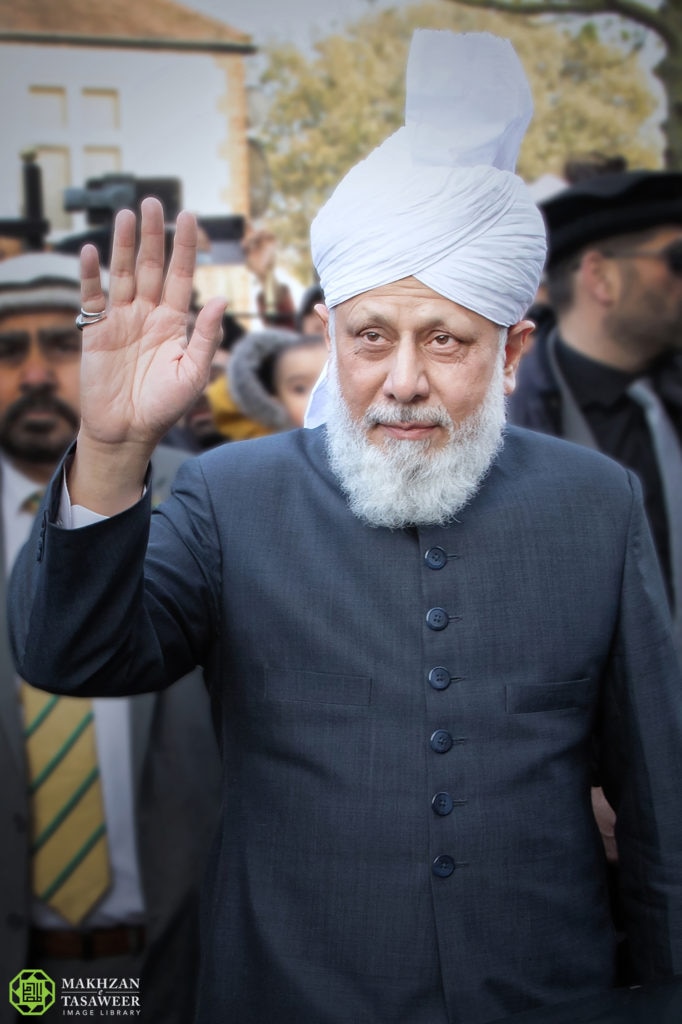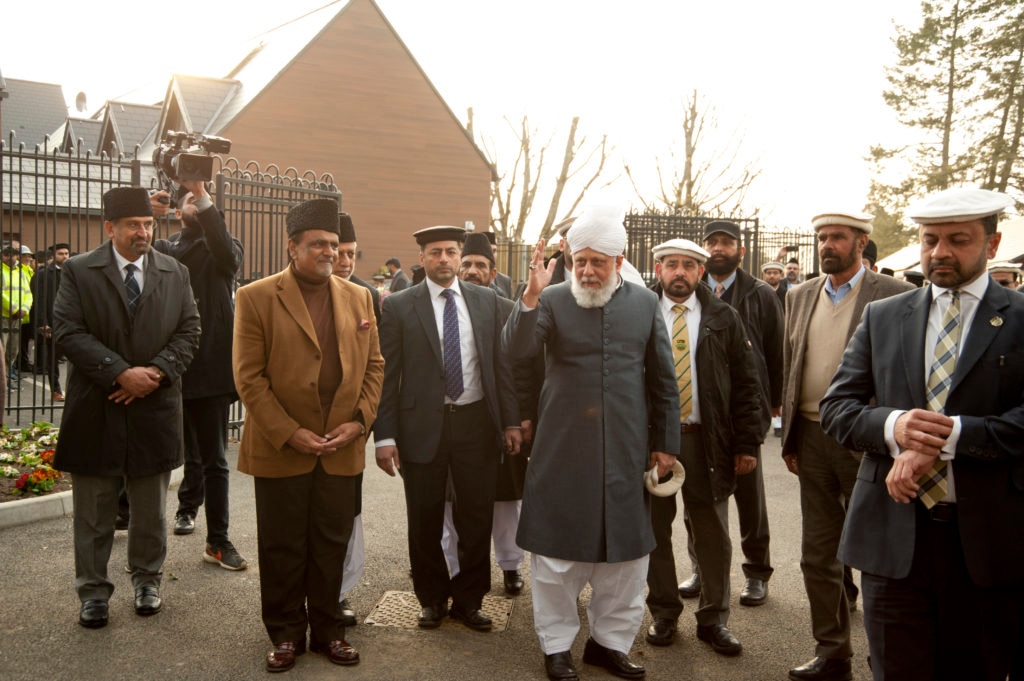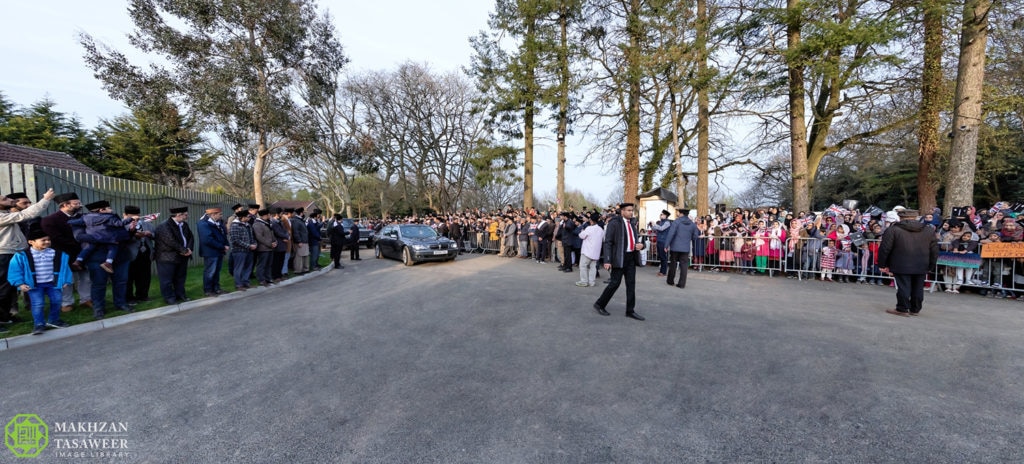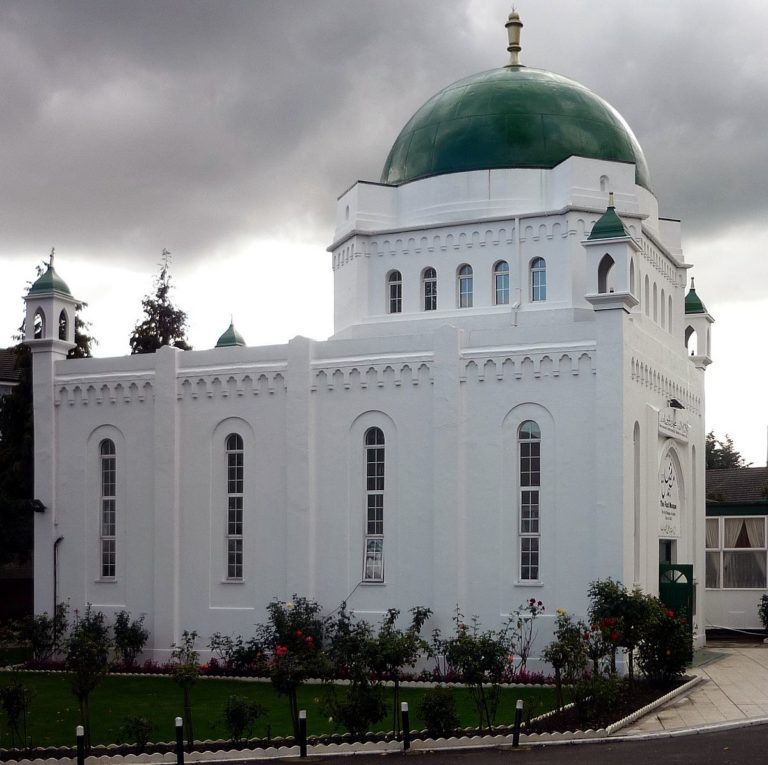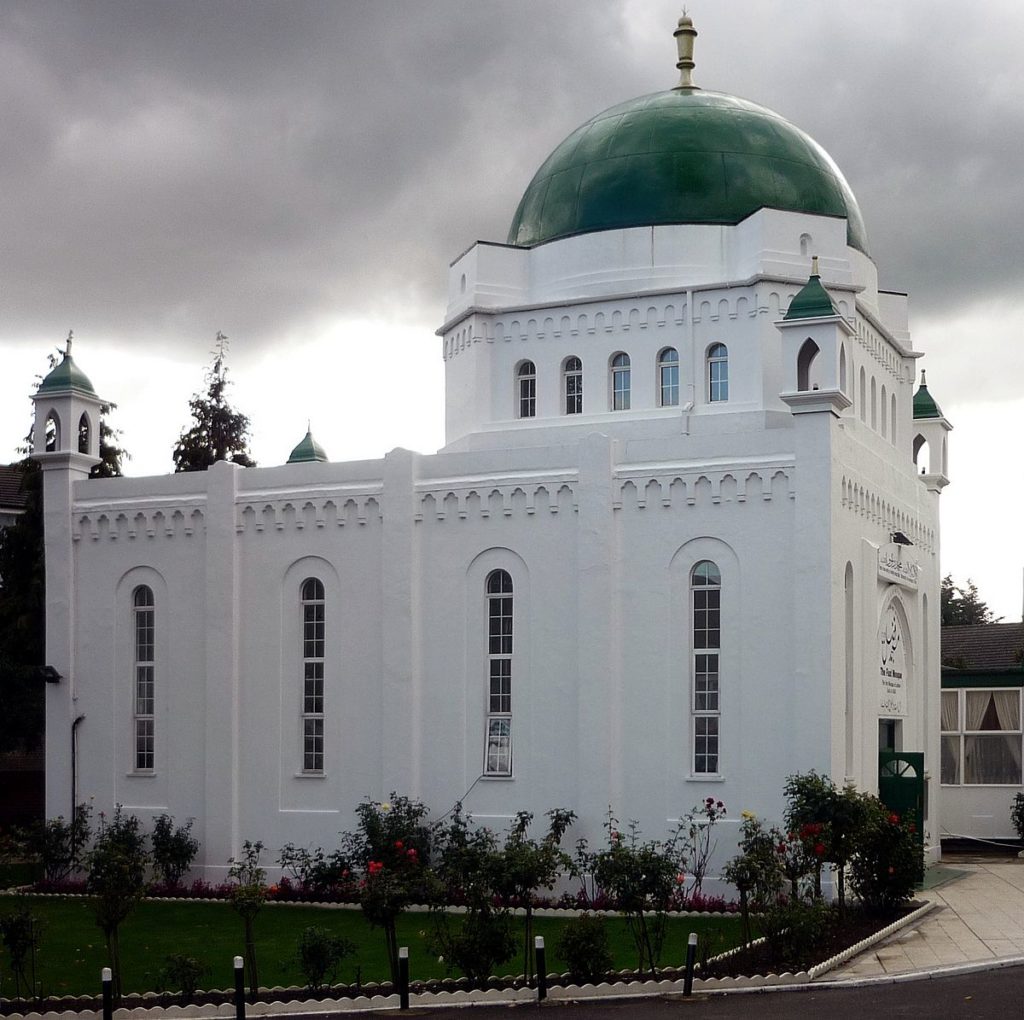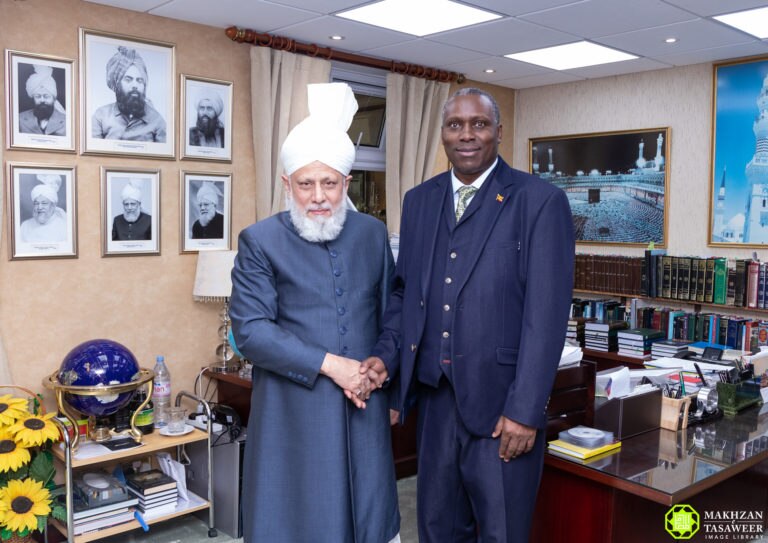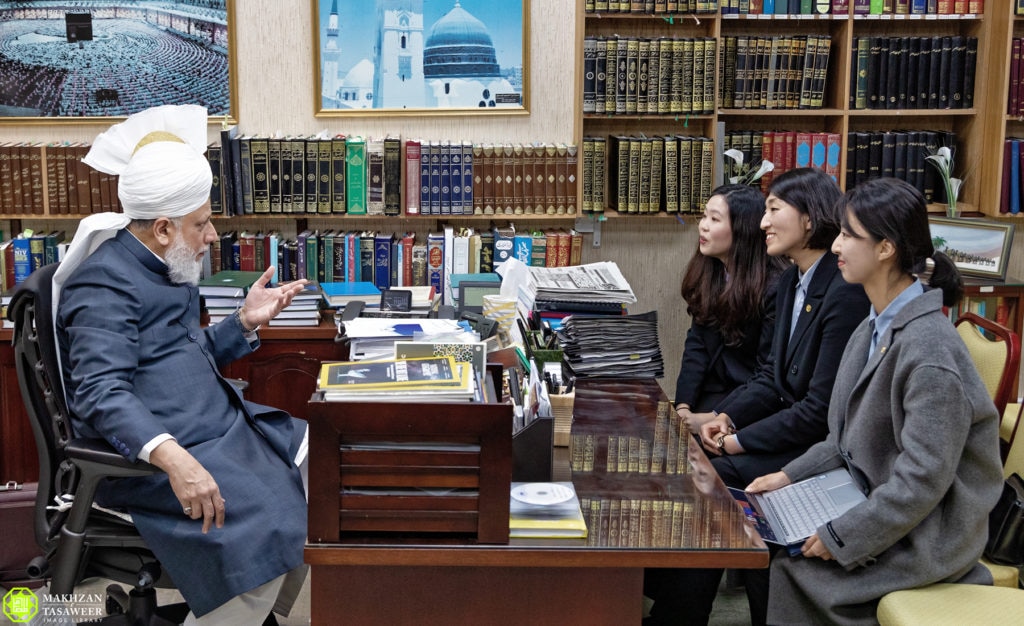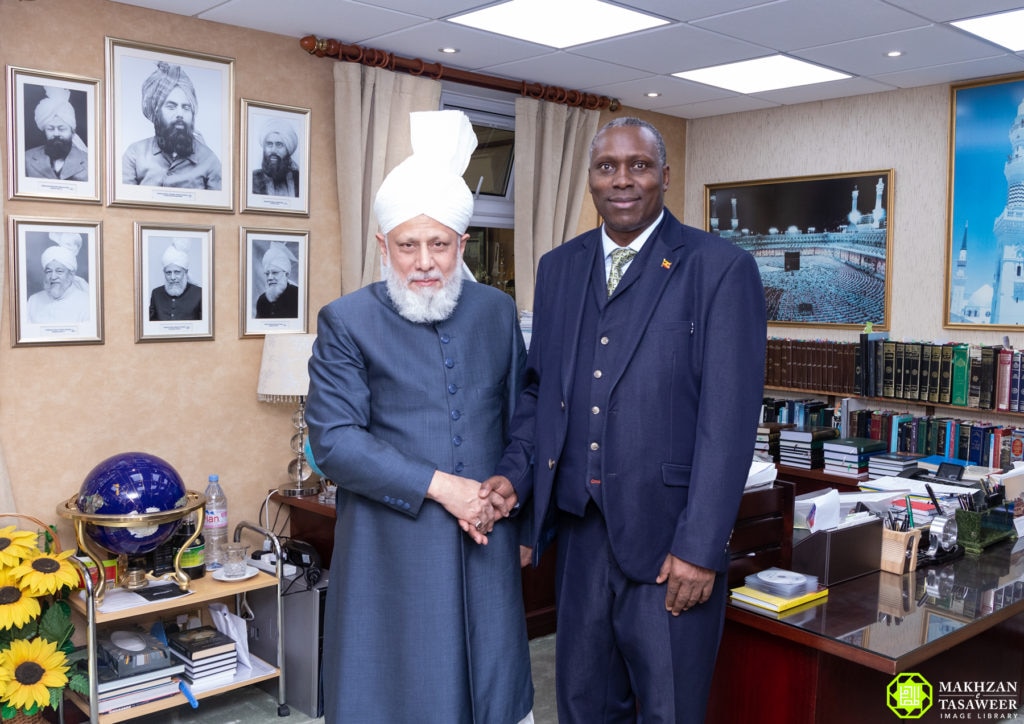Friday Sermon
22 March 2019
The Promised Messiahas – The need for the Imam
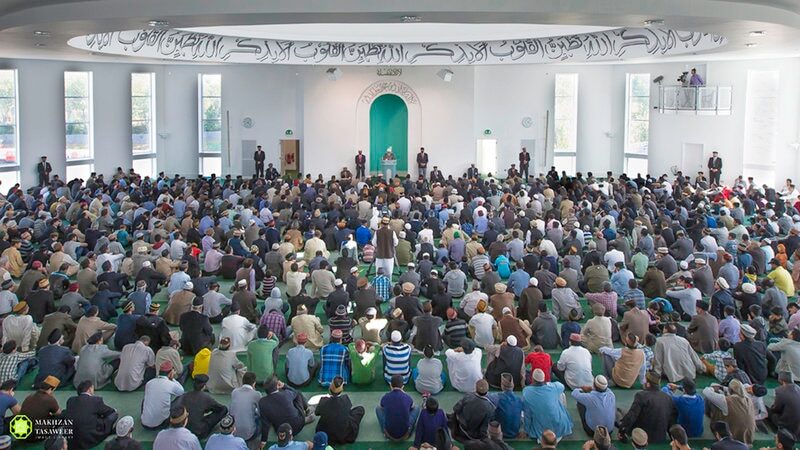
After reciting the Tashahud, Ta‘awuz, and Surah al-Fatihah, Hazrat Khalifatul Masih Vaa stated:
Tomorrow will be 23 March, and this day is commemorated in the Jamaat as the “Promised Messiah Day”. On this day, the pronouncement was made regarding that Messiah and Mahdi, who, in accordance with the prophecy made by the Holy Prophetsa, was to come in the Latter Days to convey and to spread the true teachings of Islam to the world, to unite all the Muslims under one banner and to bring followers of all religions under the subservience of the Holy Prophetsa. Hazrat Mirza Ghulam Ahmadas Qadiani declared that he was that Promised Messiah and Imam Mahdi, whose advent was prophesied by the Holy Prophetsa, and in fulfilment of this prophecy, he started taking the Bai‘at [pledge of initiation].
I will now present some sayings of the Promised Messiahas, in which he has explained about the need for the advent of the Promised Messiah, the prevailing condition of the age, his claim and the various signs related to it. He states in one of his [Urdu] couplets:
وقت تھا وقتِ مسیحا نہ كسى اَور كا وقت
میں نہ آتا تو كوئى اَور ہى آیا ہوتا
“This was indeed the appointed time for none other than The Messiah;
Had I not been appointed, someone else would surely have appeared!”
(Durr-e-Sameen, p. 160)
Thus, the need of the time yearned for an individual to come and take control of the wavering ship of Islam. Unfortunately however, the majority of the Muslim scholars, who were waiting eagerly for a messiah to appear, opposed him after he made his claim. They conjured false tales and invented stories about him in order to deter the general population of the Muslims. They incited the general population against him and his Community to the extent that they even issued edicts to kill. Even today, terrifying examples of oppression and barbarity against Ahmadis manifest themselves in some countries and places in the form of murder or killings. All this is carried out in the name of Islam, whereas those who truly understand the essence of Islam can never think of perpetrating such acts and such atrocities would never be committed by them.
Nonetheless, in light of the various writings of the Promised Messiahas, we are able to gain an insight into the conditions at the time of his advent. Moreover, the Promised Messiahas has explained the need for the advent of the Promised Messiah and why he was to appear in that particular era. The Promised Messiahas stated that he did not merely just claim to be the messiah of his own accord, rather this advent was in fact the need of the age.
The Promised Messiahas states:
“The Holy Quran clearly and markedly draws a parallel between the successorship of both the Israelite and Ishmaelite dispensations. This is apparent from the following verse:
وَعَدَ اللہُ الَّذِیْنَ اٰمَنُوۡا مِنۡكُمۡ وَعَمِلُوا الصّٰلِحٰتِ لَیَسۡتَخۡلِفَنَّہُمۡ فِى الۡاَرۡضِ كَمَا اسۡتَخۡلَفَ الَّذِیْنَ مِنۡ قَبۡلِہِمْ
[Allah has promised to those among you who believe and do good works that He will surely make them Successors in the earth, as He made Successors from among those who were before them. (Surah al-Nur, Ch.24: V.56)]
The Promised Messiahas continues:
“The last successor of the Israelite dispensation who appeared in the fourteenth century after Moses, on whom be peace, was the Messiah of Nazarethas. In parallel to this, it was necessary for the Messiah of this Ummah to also appear at the head of the fourteenth century. Additionally, those blessed with visions have declared this century to be the one in which the Messiah would appear.”
In other words, many such saintly individuals who had a strong connection with God and were recipients of divine revelations had affirmed this.
The Promised Messiahas further states:
“Shah Valiyullahrh and others have from among the Ahl-e-Hadith all agree that all the minor signs (alamaat-e-sughra) and to some extent the major signs (alamaat-e-kubra) have been fulfilled (all the minor and major signs related to the Promised Messiahas have been fulfilled). However, they have erred somewhat in this respect. All of the signs have been fulfilled.”
It is not the case that only some of the signs have been fulfilled, rather all the signs for the Messiah have been fulfilled.
The Promised Messiahas then states,
“The major sign or hallmark of the one who is to appear can be found in Bukhari as follows:
یَكْسِرُ الصَّلِیْبَ وَیَقْتُلُ الْخِنْزِیْرَ
In other words, the era in which the Messiah shall descend is marked by the dominance of Christianity and prevalent worship of the cross. Is this not such a time? Has there been such a time from the era of Adamas until now when such harm was ever inflicted upon Islam by the Christian priests? Division has plagued every country. There is no Muslim family who has not lost a member or so to their hands. Hence, the era of he who was to come is one in which worship of the cross would be dominant. What could be more dominating than what we see now? Vicious attacks like those of ravenous beasts have been made against Islam.”
These words are enough to answer the allegation that the Promised Messiahas was planted by the British Government. From these words it can be ascertained whether the Promised Messiahas was working on the orders of the British Government, or whether he was appointed by God Almighty to defend Islam and to prove its superiority. The Promised Messiahas continues:
“Is there a single group that has not made the most savage of remarks against the Noble Messenger, peace and blessings of Allah be upon him, and hurled abuse at him? If now is not the time for the advent of the awaited one, the earliest that he can appear now is after a hundred years. For a divinely appointed reformer (mujaddid) must always appear at the head of the century. Now, does Islam possess enough strength to combat the ever-increasing dominance of the Christian priests for another century? This ascendancy has reached its pinnacle and the one who was to appear has come. Now, he shall destroy the Anti-Christ with clinching argumentation. For it is recorded in the Hadith that nations would be overturned, not people themselves or the individuals that comprise these nations. And so has it occurred.” (Malfuzat, Vol. 1, pp. 47-48)
That is, the purpose of the Messiah of the dispensation of Muhammadsa was to prove the superiority of the teachings of Islam over all other religions through arguments and proofs. Similarly, he was going to present the teachings of Islam in order to prove its superiority over all religions and nations. The thousands of non-Muslims, who enter the fold of Ahmadiyyat every year do so on the basis of the arguments and proofs presented by the Promised Messiahas.
The Promised Messiahas further writes in relation to the circumstances of the time and the need of the Promised Messiah:
“If the land is uncultivable, rain is of no benefit; in fact, it is damaging and harmful (if the soil of the land is not good or is barren or firm, then it is futile). And so, heavenly light has descended and it is illumining the hearts of the people. Prepare yourself to accept it and benefit from it (i.e. prepare the condition of your hearts) so that in the likeness of barren land that gains no benefit from rainfall (and will go to waste), you too do not walk in darkness and stumble, and consequently perish, falling into a dark abyss, despite the presence of light.”
It should not be the case that you also stumble, i.e. despite the presence of light, one falls in a pit of darkness. The Promised Messiahas further says:
“Allah the Exalted is more merciful than a compassionate mother. He does not wish for His creation to be wasted. He reveals to you the paths of guidance and light. But in order to tread these paths, you must utilise your reason and purify your souls. Just as planting does not occur until the soil is ploughed to prepare it, so too pure reason cannot descend from heaven until souls are purified through strenuous effort and rigorous self-discipline. In this age, God has shown immense grace and as He is jealous for His religion and His Prophet, peace and blessings of Allah be upon him, He has sent a man, who speaks to you now so that He may invite you towards this light. If the present era had not been plagued by such corruption and disorder and efforts to expunge religion had not been undertaken, then there would be no issue whatsoever. However, at present you can observe from east to west that nations are preoccupied in removing all traces of Islam.”
An attack is being launched on Islam from all sides and this continues even until today. The Promised Messiahas then says:
“I remember, and I have stated this in my book Barahin-e-Ahmadiyya as well, that 60 million books against Islam have been written, compiled and printed already.” This was during the time of the Promised Messiahas approximately 125 years ago, rather almost 150 years ago.
The Promised Messiahas further continues:
“It is strange that the Muslim population in India is 60 million and the number of books written against Islam are also equivalent in number.” At the time, the Muslim population was some 60 million, but now it is approximately 500-600 million, or perhaps even more than this.
The Promised Messiahas then says, “If we disregard the number of books that have been added to this figure, even still our opponents have handed one book to each and every Muslim in India.”
The number of books written in opposition to Islam were equal to the Muslim population of the time. But now, through various media outlets, social media, internet and other means, it has a far wider impact. New means have been invented which are being utilised. The Promised Messiahas says that the opponents have printed books and have distributed them to every Muslim.
The Promised Messiahas further writes:
“If the jealousy of Allah the Exalted had not surged forth and were it not for His true promise
اِنَّا لَہٗ لَحَافِظُوْنَ
[And most surely We will be its Guardian. (Surah al-Hijr, Ch.15: V.10)]
know for certain that today Islam would have been wiped off the face of the earth and all traces of it would have been effaced. But no, this can never happen. The hidden hand of God is protecting it. What disappoints and pains me is that the Muslims do not care for Islam even to the extent that one cares for their marital relations. I have often had the opportunity to read that even Christian women, on death, bequeath hundreds of thousands of rupees for the propagation and spread of the Christian faith.” (In those days, the Christians were more inclined towards their faith and especially their women.) “And as far as devoting their lives for the dissemination of Christianity is concerned, this is something we observe daily.”
Relating the circumstances of those times, the Promised Messiahas says:
“Thousands of lady-missionaries go from home to home and street to street and strip the people of their faith in any way possible”, i.e. the Christian women would propagate their faith. “I have yet to see a single Muslim who has bequeathed even 50 rupees on their deathbed for the propagation of Islam. In contrast, at marriages and for worldly customs, they spend extravagantly…”
This extravagance is present even in this day and age. The little contribution they make the way of Islam is insignificant when compared to their worldly expenditures. The Promised Messiahas then says:
“…and even incur debt to squander their wealth relentlessly. But when it comes to Islam, they have nothing. Alas! What a pity! Could the state of the Muslims be any more deplorable?”
(Malfuzat, Vol. 1, pp. 72-74)
Even today, the condition of the Muslims remains the same. Even though their condition has improved somewhat in this regard, however, as I have mentioned that even then they do not spend a fraction of that which they spend in fulfilling their worldly pursuits.
The aforementioned description refers to the circumstances of the time when the Promised Messiahas made his claim. As I have mentioned, if a faction among the Muslims have now started to pay attention towards faith, it is only to the extent so that they have at least some attachment to Islam. And so, there has been some improvement in that people are now more inclined towards remaining attached to faith. They have also populated mosques to a certain extent. However, they are not making any efforts to spread the teachings of Islam. Even if some so-called efforts are being made, however they are with the intention of forcefully compelling others to accept Islam.
With regard to this, many groups have formed and are also employing their efforts in order to oppose the Promised Messiahas and his community. Thus, it should always be remembered that if Islam is to spread across the world today, it will spread only through this appointed and chosen one of God – and this is decree of God Almighty.
Allah the Exalted and His Messengersa also foretold some signs for the advent of the Promised Messiah. It would not be the case that the appointed one would make a claim without the support of any signs. Hence, alluding to this fact, the Promised Messiahas states:
“Another sign in support of the awaited one is that in his era, during the month of Ramadan, the solar and lunar eclipses will occur. Those who ridicule divine signs in fact mock God Himself. For the solar and lunar eclipse to take place after the claim of the awaited one is something that no one could possibly forge or fabricate.”
One cannot say that this was conjured nor was it a mere coincidence or an act of deceit. The Promised Messiahas says:
“Before this, no such solar or lunar eclipse has taken place. This was a sign by which Allah the Exalted was to proclaim the arrival of the awaited one throughout the entire world. And so upon witnessing this sign, the Arabs have also proclaimed its truth, as is their nature. Wherever our announcements could not reach to serve as public pronouncements, this solar and lunar eclipse announced the coming of the era of the awaited one. This was a sign of God completely free from human machination. No matter how strictly philosophical a person may be, they ought to reflect and contemplate that when the appointed sign has been fulfilled, it necessarily follows that the one in whose favour the sign was manifested, must also be present. This was not a matter that could have been predetermined, because it was stated that the sign would be manifested after a person who claimed to be the Mahdi had appeared.” This sign will appear when the claim of the Messiah and Mahdi has already been made. “The Noble Messenger, peace and blessings of Allah be upon him, also said that no such incident would have occurred from the time of Adamas to this Mahdi. If anyone can historically show otherwise, I shall accept.” (Malfuzat, Vol. 1, pp. 48-49)
The Promised Messiahas further states:
“Another sign of the era was that the star Dhus-Sinin would emerge, i.e. the star of years gone by. In other words, the star which emerged in the time (or years) of the Messiah of Nazarethas. Now, even that star has appeared, which gave heavenly news of the coming of the Jewish Messiah. Similarly, we find in the Quran:
وَاِذَا الۡعِشَارُ عُطِّلَتۡ۔ وَ اِذَا الۡوُحُوۡشُ حُشِرَتۡ۔ وَ اِذَا الۡبِحَارُ سُجِّرَتۡ۔ وَ اِذَا النُّفُوۡسُ زُوِّجَتۡ۔ وَ اِذَا الۡمَوۡءٗدَۃُ سُئِلَتۡ۔ بِاَىِّ ذَنۡۢبٍ قُتِلَتۡ۔ وَ اِذَا الصُّحُفُ نُشِرَتۡ۔
[And when the she-camels, ten-month pregnant, are abandoned; And when the beasts are gathered together; And when the seas are made to flow forth one into the other; And when people are brought together; And when the girl-child buried alive is questioned about, “For what crime was she killed?” and when books are spread abroad. (Surah al-Takwir. Ch.81: V.5-11)]
All these prophecies are mentioned in the Holy Quran, for example, beasts would be gathered together [etc.]. There are various explanations of these, for instance, zoos have been created. Also, in fulfilment of these prophecies, knowledge has become accessible and spread across the world; some nations have attacked the native people and destroyed them. It also mentions that oceans will be merged together and that people will become like one community. Communication has now also become extremely easy and one is able to communicate across the world within seconds. Furthermore, it states in the Quranic prophecy that women, who were treated cruelly at that time, whose rights were suppressed and were even killed, will question as to what grounds were they being killed on? Books will be spread far and wide and then is also the advancement of press and media.
Thus, all of these various aspects prove the fact that this is the era of the Promised Messiah and the prophecies in relation to this are found in the Holy Quran. The Promised Messiahas then states:
“Meaning, in that era, she-camels, which previously were the best means of transport and conveyance, shall become useless. In other words, during that era (i.e. during the time of the Messiah), the mode of transport will become so advanced that these earlier forms would be rendered useless. This alluded to the age of locomotives.”
This referred to the era of railways. Furthermore, in accordance with one of the prophecies of the Promised Messiahas, there is now a railway in operation between Medina and Mecca, or at the very least, the railway track has been laid out. The Promised Messiahas further states:
“Those who believe that these verses speak of the Resurrection do not stop to reflect how a she-camel could remain pregnant at such a time. The word ishar refers to pregnant she-camels. Then, these verses state that streams would be made to flow forth in all directions and books would be published abundantly. Hence, all of these signs relate to the era under discussion.” (Malfuzat, Vol. 1, pp. 49-50)
Presenting further evidence in relation to where the Promised Messiah was to appear, the Promised Messiahas writes:
“As for the place of the Promised Messiah’s advent, it ought to be remembered that the emergence of the Antichrist has been foretold to take place from the East and this refers to our country. The author of Hijaj-ul-Kiramah writes that the disorder of the Antichrist is manifesting itself in India. And it is obvious that the Messiah must also appear in the same place that the Antichrist emerges. Then, it is narrated that the Messiah would appear in the village of Qad‘ah, which is short for ‘Qadian.’ It is possible that in Yemen a village by this name exists, but one ought to remember that Yemen is not to the east of Hijaz, rather it is to the south.”
The Promised Messiahas further writes:
“…Furthermore, the name given to me by divine destiny and decree is also a subtle indication to this very fact. According to Abjad numerals, the numerical value of the letters in ‘Ghulam Ahmad Qadiani’ equal 1300 exactly. In other words, the Imam whose name this is, was to come at the start of the fourteenth century. Thus, this was alluded to in the prophecy of the Holy Prophetsa.” (Malfuzat, Vol. 1, p. 50)
In relation to the signs of the Messiah of the latter days, the Promised Messiahas states:
“Calamities were also to serve as a sign.” There would be various sorts of calamities and trials during the time of the Messiah. The Promised Messiahas then says:
“Heavenly calamities took on the form of famine, plague and cholera. The plague is an affliction so vicious that it has even shaken the government…” the period of time which is being referred to by the Promised Messiahas was during the plague in India which took on a devastating form and lasted for five or six years “…and if it continues to grow, it shall devastate the entire country. As for earthly calamities, there are wars and earthquakes, which have destroyed the land.” (As for wars, they are continuing even to this day.) “It is necessary for a person commissioned by Allah to manifest heavenly signs in support of their truth as well.”
The Promised Messiahas further writes:
“Was the sign of Lekhram not a magnificent sign? This contest ensued for many years with the term outlined in advance. This encounter went on for five years without fail. Both parties published announcements and the matter gained publicity.” (It became common knowledge that Lekhram was in a contest with the Promised Messiahas.) “It gained unmatched publicity. Then, the events unfolded exactly as prophesied. Is there any other example of such an occurrence? Similarly, well before the Conference of Great Religions (Dharam Mahautsav) I announced many days in advance that Allah Almighty had informed me that my essay would be superior to all others. Those who witnessed this grand and awe-inspiring conference can reflect and understand for themselves that to foretell one’s triumph over all others in a conference of such stature could not have been a mere conjecture or guesswork. Ultimately, the prophecy was fulfilled.” (Malfuzat, Vol. 1, pp. 50-51)
This was in relation to the book of the Promised Messiahas, The Philosophy of the Teachings of Islam. I will read out a statement from a newspaper at the time regarding this. General Gohar Asifi of Calcutta writes, “During this conference, if the paper of Hazrat Mirza Sahib was not presented, Muslims would have suffered humiliation and disgrace at the hands of the other faiths. However, the glorious hand of God the Exalted protected the holy faith of Islam from falling. As a matter of fact, due to this paper, it was granted such a victory that besides those that were already in support thereof, even the opponents could not help but proclaim that this paper was superior to all others.” (Tarikh-e-Ahmadiyyat, Vol. 1, p. 572)
The person who wrote this was not an Ahmadi, however he was compelled to admit this fact and similarly, many other newspapers paid similar tribute and quoted other non-Ahmadis.
With regard to further signs of being divinely appointed, the Promised Messiahas goes on to state:“In short, even at this time, there are many proofs of my being commissioned from God. Firstly, there is internal evidence. Secondly, there are external proofs. Thirdly, there is the saying of the Prophet Muhammadsa about the arrival of one who would rejuvenate faith at the turn of every century. Fourthly, there is the divine promise of preserving the Quran in the words:
اِنَّا نَحْنُ نَزَّلْنَاالذِّكْرَ وَاِنَّا لَہُ لَحَافِظُوْنَ
[Surely, We have sent down the Quran, and it is indeed We Who shall safeguard it. (Surah al-Hijr, Ch.15: V.10)]
“The fifth proof – which is an outstanding sign – is the divine promise in Surah al-Nur, the promise of Divine Successorship. God Almighty states therein (as has been mentioned earlier):
وَعَدَ اللہُ الَّذِیْنَ اٰمَنُوۡا مِنۡكُمۡ وَ عَمِلُوا الصّٰلِحٰتِ لَیَسۡتَخۡلِفَنَّہُمۡ فِى الۡاَرۡضِ كَمَا اسۡتَخۡلَفَ الَّذِیْنَ مِنۡ قَبۡلِہِمْ
[Allah has promised to those among you who believe and do good works that He will surely make them Successors in the earth, as He made Successors from among those who were before them. (Surah al-Nur, Ch.24: V.56)]
“According to this promise of Divine Successorship, the Caliphs of the dispensation of Muhammadsa shall be like the Caliphs of the dispensations before them.
“Similarly, the Holy Quran has also mentioned the Holy Prophet Muhammadsa would appear in the likeness of Mosesas, as it states:
اِنَّاۤ اَرۡسَلۡنَاۤ اِلَیْكُمۡ رَسُوۡلًا ۬ۙ شَاہِدًا عَلَیْكُمۡ كَمَاۤ اَرۡسَلۡنَاۤ اِلٰى فِرۡعَوۡنَ رَسُوۡلًا
[Verily, We have sent to you a Messenger, who is a witness over you, even as We sent a Messenger to Pharaoh. (Surah al-Muzzammil, Ch.73: V.16)]
“And the Holy Prophet Muhammadsa is ‘like unto Moses’ according to the prophecy of Deuteronomy as well (a prophecy of the Bible). Hence, just as the words kama [like unto] have been used in this parallel [between Muhammadsa and Mosesas], similarly, the words kama have been used in the promise of Divine Successorship in Surah al-Nur. It becomes clear from this that there is a perfect similitude and likeness between the Mosaic dispensation and the dispensation of Muhammadsa. The system of Mosaic successorship came to a close with the advent of Jesusas, who appeared in the fourteenth century after Mosesas. The running parallel between the two spiritual systems demands that a Caliph resembling the qualities and powers of the first Messiah also be born in the fourteenth century, who would come resembling him in spirit and essence.
“So, even if God Almighty had not presented this and other evidences as proof, still, this running parallel between the two spiritual systems naturally demanded that a burooz [spiritual reflection] of Jesusas should also appear among the followers of Muhammadsa, otherwise, it would prove to be a flaw and imperfection in the perfect parallel between the two spiritual systems, God forbid.
“However, not only did God Almighty demonstrate and support the truth of this parallel [between the two dispensations], but He demonstrated that the one who would come in the likeness of Moses was far superior to Moses and indeed all prophets (peace be upon them)”, i.e. the Holy Prophet Muhammadsa stands superior to all other prophets.
The Promised Messiahas writes:“Just as Jesusas did not bring any new law, but came to fulfil what was in the Torah, so, too has the Messiah of the dispensation of Muhammadsa not introduced any new law, but has come for the rejuvenation of the Quran (to revive and propagate the teaching of the Holy Quran). He has come to bring about that perfection which is known as ‘perfect renaissance of Islam.’” (Malfuzat, Vol. 4, pp. 9-10)
The Promised Messiahas further writes in relation to this:“Regarding the perfect renaissance of faith, it should be remembered that Itmam-e-Nemat and Ikmaal-ul-Din that were granted to the Holy Prophetsa (meaning that religion reached its perfection and Divine favour reached the highest point possible) have two aspects to it. First was the perfection of Divine guidance, and secondly the complete propagation of this guidance.”
The Promised Messiahas further continues:“In every respect, the perfection of guidance took place during the first advent of the Holy Prophetsa.” All spiritual guidance reached its perfection by virtue of the Holy Prophet’ssa advent and the arrival of the Quranic Shariah, “and the perfection of the propagation of faith, (i.e. the spread of this message) was to take place through the second advent of the Holy Prophetsa. This is because the verse in Surah al-Jumuah which reads, ‘and there are others from among them,’ demands that another group of people should also be prepared through his grace and guidance.
“From this, it becomes clear that there is another advent of the Holy Prophet Muhammadsa, and this advent in the form of a buroozi manifestation [spiritual reflection of the Holy Prophetsa] which is taking place in this era.
“Hence, this age is the age in which there was to be a complete spread of this faith. This is also why all means of communication and conveyance are also reaching their pinnacle. There is a multitude of publishing houses, countless printing presses, and with each day, there are further improvements and developments in publishing and printing.”
Publishing industries are continuingly advancing and using the latest forms of technology.
“There is also the use of courier and mail services and the emergence of post offices, wired mail, the railroad, airplanes and the publication of newspapers – all of these things have combined to transform the world into a global village.
“In actual fact, these advancements are in service of the Holy Prophetsa, because through them, the perfect renaissance of Islam, i.e. the complete spreading and delivery of his message, is taking place.” (Malfuzat, Vol. 4, pp. 9-10)
The Promised Messiahas states:“Now, let a rational person assess all these aspects in their entirety and reflect: Is what we say worthy of being rejected after only a cursory glance? Or does it demand that one seriously and solemnly analyse and ponder over it? Whatever we claim, has it all been fulfilled at precisely the turn of the century or not? Even if I had not come, even then, it was necessary for every intelligent and God-fearing person that he search for a Divinely appointed one, because the turn of the century had come. And since now that twenty years are coming to pass [since the turn of the century], there was an even greater need to ponder over the matter. The disorder of this age itself was lamenting and crying out that someone should come for its reformation.”
The Promised Messiahas further says:“Christianity has spread such unrestrained and uncontrolled freedom as knows no bounds at all. Consequently, the impact it has had on the children of the Muslims is that they do not at all reflect the traits of Muslims.” (Malfuzat, Vol. 4, pp. 13-14)
With regard to how one can determine and ascertain the truth, the Promised Messiahas states:“People ought to supplicate to God Almighty in their prayers that He reveal the truth to them. And I firmly believe that if a person removes himself from all bias and stubbornness, and sincerely – for the acquisition of truth – turns his attention towards God Almighty, then a period of 40 days shall not pass that the truth will be made manifest to the supplicant. “However, there are extremely few who – fulfilling these conditions – seek a verdict about the truth from God. And so, due to their lack of understanding, or their stubbornness and bias, they end up rejecting the appointee of God, and thereby corrupt their faith. This is because the saintly disposition of the prophet serves as a means of establishing the truthfulness of his prophethood and thus the rejection of a prophet is tantamount to rejecting God, consequently causing one to lose their faith altogether.” (Malfuzat, Vol. 4, p.16)
After presenting these excerpts from the writings of the Promsied Messiahas, I will present several excerpts and narrations of Hazrat Musleh-e-Maudra which he wrote and presented on various occasions regarding this subject.
On one occasion, He said:“When opposition intensifies, the Jamaat – as a natural consequence – also progresses. When opposition grows, the miraculous and divine aide and succour of Allah likewise increases.”
Accordingly, in reference to the Promised Messiahas, Hazrat Musleh-e-Maudra states:“Whenever any friend, upon meeting the Promised Messiahas, would mention that great opposition had risen in their locality, the Promised Messiahas would reply by saying that this in fact was a sign of their progress. Wheresoever there is opposition, the Jamaat experiences growth because as a result of that opposition, many who were previously unaware of even the Jamaat’s existence become aware of it and gradually become inclined towards reading the books of the Jamaat. When they cover the Jamaat’s literature, its truth becomes deeply rooted in their hearts.”
Hazrat Musleh-e-Maudra states:“An individual once came to meet the Promised Messiahas and pledged his allegiance. After his conversion, the Promised Messiahas asked him who it was that presented to him the message of Islam Ahmadiyyat? He spontaneously replied, ‘The individual that brought this message to me was Maulvi Sanaullah Amritsari’” (a bitter opponent of the Promised Messiahas). “Surprised by the answer, the Promised Messiahas asked, ‘How is this so?’
The individual answered, ‘I regularly read the books and newspapers of Maulvi Sahib and noticed that it would always be filled with content that was bitterly opposed to the Ahmadiyya Community. It occurred to me one day that I should myself at least have a look at the books of this community as well.’” Since there was so much opposition, he decided to read the books of the Promised Messiahas himself. He thus said, “‘When I began to read the books of the Jamaat, my heart receptively opened to its teachings and I became ready to convert’. Thus, the foremost benefit of opposition is that divine communities see progress and many souls as a result are guided to the right path.” (Tafsir-e-Kabir, Vol. 6, p. 487)
As regards the opposition faced by the Promised Messiahas and the reaction of prophets in the face of opposition, Hazrat Musleh-e-Maudra has given the example of the ancient Egyptian empire:“At the apex of its political dominance, the Egyptian empire held great power and its monarchs (the Pharaohs) took great pride in their strength and authority. In retrospect to this, Mosesas was, in material strength, an insignificant individual. Yet, despite this, he went to the Pharaoh’s throne with his message. The Pharaoh, in response, warned him and openly threatened that if he did not cease from propagating his message, he would not only put an end to his life; along with him, his entire nation would be utterly destroyed. Yet, Mosesas replied that no earthly power could stop him from delivering to the world the message he had been ordained by God to propagate.”
Hazrat Musleh-e-Maudra further states:“The Promised Messiahas stated that this was the case with Jesusas and the Holy Prophet Muhammadsa. Similar has been the case of the Promised Messiahas which we have witnessed in our era. All nations stood in opposition to him, to the extent that even the government, in one way, was his opponent as well. Albeit towards the latter part of his life, this opposition had somewhat subsided. Regardless, the overwhelming majority of people had become his opponents. The followers of all faiths had declared opposition to him alongside the Muslim clerics; custodians of shrines opposed him, the masses in general as well as the affluent and social elite stood as his enemies. In short, a storm of opposition raged on all sides. Many people tried their utmost to dissuade him from his mission, to the extent that some in the guise of friendship even reasoned that he should drop some of his claims. Some came and told him that if he was to simply forgo such and such claim, the masses would readily enter into the fold of his community. But the Promised Messiahas did not pay any heed to their words and resolutely continued to present his claims. His enemies caused a commotion, persecution persisted to the extent that some were even killed. But despite the plethora of hardships (which continue to this day) and despite the fact that the Promised Messiahas faced opposition, against which he possessed absolutely no apparent strength nor had any means of defense, he continued to strive forward in his mission.”
Hazrat Musleh-e-Maudra further writes:“I clearly remember hearing this example from the Promised Messiahas multiple times. He said that the case of the prophets was similar to a famous fable which people narrated regarding an elderly woman who had become senile and lived in a village. Whenever she left her home and went outside, young children would gather and start to tease her, mock her and constantly trouble her. She too, on her turn, would retort to profanities and curse back at them. One day, the habitants of the village consulted with one another and decided that their children had been unjustly teasing and mocking the old woman and she had been ictimized long enough. They conferred, they must stop their children from teasing her, lest her cursing and praying against them, in her state of helplessness, should manifest an undesirable outcome. They decided to stop their children from disturbing her and as a result she would cease from cursing them. Accordingly, they decided that from the following day, every household would keep all their children locked up inside their house and not let them outside.
“So, everyone prohibited their children from leaving the house the next day, and they locked their doors from the outside with chains as an added safety measure. When the sun rose, and the senile lady came outside, she wandered the streets for some time. She would walk in one direction then another, but could not see anyone. Previously, the circumstances were such that one boy would be pulling her shirt, another would pinch her and some would push her; someone would pull her hand and there would be some who would tease her. However, that day she could not see any of them. She waited for them until the afternoon, but when she observed that no one came out of their homes, eventually she went to the local shops. She would stop by at every shop and would say, ‘Did your house collapse today? Have all the children passed away? What has happened? I do not see any of them.’
“When she visited every shop and said the same thing, after a while, everyone said, ‘Whether we keep the children in or not, we still have to listen to her abuse, therefore let the children out. Why should we lock them up?’
“After narrating this fable, the Promised Messiahas would say, ‘The condition of the Prophetsas is quite similar. The world troubles them, creates difficulties for them, persecutes them and oppresses them. They torment them to the extent that it becomes difficult to live and some people amongst them begin to feel that these people are cruel and they should not act in this manner. However, even those people cannot renounce the world. When the world does not oppress the Prophets, they worry and awaken them in order to direct the world’s attention towards them, and their message is heard.’” (Khutbat-e-Mahmud, Vol. 24, pp. 272-274)
Irrespective of how the messages reaches them, at times, even virtuous people are enabled to accept the message amidst the opposition.
Hazrat Musleh-e-Maudra states:“Maulvi Muhammad Hussain Batalvi Sahib was the Promised Messiah’sas childhood friend and he knew him well. He always used to praise the Promised Messiah’sas writings. After the Promised Messiah’sas claim, Maulvi Muhammad Hussain Batalvi Sahib announced, ‘I am the one who established him, and I am the one who will now ruin him.’ Who would have imagined at the time that, if someone as honourable and influential as Maulvi Muhammad Hussain Batalvi would say something about destroying a person, subsequently that person would not be annihilated?”
He was indeed a person with the power to do what he claimed.
“The relatives of the Promised Messiahas also openly declared, and some of them published this in the newspapers, that the Promised Messiahas only seeks to fulfil his worldly interests and therefore no one should pay any attention to him. In this manner, they tried to make the entire world doubt him.”
Hazrat Musleh-e-Maudra further states:“I can still recall from my early years that many workers, who are known as kammi in the system of land and property ownership, refused to do their household chores” (the servants completely refused to work for the Promised Messiahas) “and our relatives were the ones who had instigated this. In short, his relatives and those who were strangers united to efface him and tried to destroy him.” (Al Fazl, 13 November 1914, pp. 2-3)
However, after all, what was the outcome? Today, his name is remembered in 212 countries of the world. If this is not a sign of his truthfulness, then what is?Whilst narrating another sign of his truthfulness, Hazrat Musleh-e-Maudra states:“God Almighty raised the Promised Messiahas in our midst, and his existence became a manifest sign for us. Whoever sat before him witnessed the verities of the Holy Quran and the Holy Prophetsa, and there remained nothing that would deter such a person from Islam. When a case about Karam Din Bheen was filed against the Promised Messiahas, the magistrate at the time was a Hindu. The Aryas persuaded him to sentence the Promised Messiahas, and he promised them to do so. Khawaja Kamaluddin Sahib became worried when he heard of this. He visited the Promised Messiahas in Gurdaspur, where he was staying during the trial, and stated, ‘Huzooras, I have news of great concern! The Aryas have swayed the magistrate, and he has taken an oath to sentence you.’ At the time, the Promised Messiahas was laying down, he sat up straightaway and stated, ‘Khawaja Sahib! Who can place their hands on the Lion of God? I am the Lion of God; let him try to put his hands on me.’
“Hence, this is precisely what followed. This case was presented in the courts of two magistrates one after the other and both of them were severely punished. One of them who wanted to take action against the Promised Messiahas was suspended. The other magistrate lost his son who drowned in a river, and this incident affected him so much that he became partially insane.”
Hazrat Musleh-e-Maudra states:
“Once I was travelling to Delhi and met him [the aforementioned magistrate] at Ludhiana station. He said to me with immense humility and pain, ‘Please pray that Allah Almighty grants me patience. I have made tremendous mistakes, and my condition is such that I fear that I may become insane.’ He continued, ‘One of my sons passed away but I have another son. Please pray that Allah Almighty protects both of us from ruin (owing to his conduct against the Promised Messiahas).”
Hazrat Musleh-e-Maudra writes, “Hence, the words of the Promised Messiahas were fulfilled, that is, ‘Who can lay their hands on the Lion of God’ and the Aryas failed in their ploy.” (Tafsir-e-Kabir, Vol. 6, p. 359)
Hazrat Musleh-e-Maudra further relates:
“There is an interesting incident that took place during the time of the Promised Messiahas. Mian Nizamuddin was a friend of the Promised Messiahas and also of Maulvi Muhammad Hussain Batalvi Sahib. He had performed the Hajj seven times and had a very cheerful and light-hearted personality. Since he maintained friendly relations with the Promised Messiahas and also Maulvi Muhammad Hussain Batalvi Sahib, therefore he was greatly perturbed when Maulvi Muhammad Hussain Batalvi Sahib issued an edit of kufr [disbelief] against the Promised Messiahas upon him claiming to have been commissioned by God Almighty. This is because he had firm conviction in the piety of the Promised Messiahas. He used to live in Ludhiana and when the opponents would speak ill against the Promised Messiahas, he would argue with them and would say, ‘Go visit the Promised Messiahas and see for yourself; he is an extremely pious person. I have lived with him and have noted that if something is mentioned to him in light of the Holy Quran, he is immediately willing to accept it. He does not deceive anyone. From the Holy Quran, if someone explains that his claim is false, I am convinced that he would immediately retract his claim. He would often get into arguments with people over this and would say that he would go to Qadian himself and it would not be possible for the Promised Messiahas to not retract from his claim and seek repentance. He further said that he would open the Holy Quran before the Promised Messiahas and as soon as he would present a verse of the Holy Quran regarding the physical ascent of Jesusas into the heavens, the Promised Messiahas would straight away accept it. Moreover, he said that he knew too well that once the Promised Messiahas would hear anything supported from the Holy Quran, he could never say anything against it.
“Finally, one day, he decided to travel from Ludhiana to Qadian. Upon arriving, he immediately went to the Promised Messiahas and said, ‘Have you left Islam and rejected the Holy Quran?’ The Promised Messiahas replied, ‘How could that be possible! I believe in the Holy Quran and Islam is my faith.’ Upon this he said, ‘All praise is due to God! This is precisely what I have been telling people that you could never forsake the Holy Quran.’ He then said, ‘Very well, if I present hundreds of verses from the Holy Quran which prove that Jesusas physically ascended into the heavens alive, would you then accept this?’ The Promised Messiahas replied, ‘Even if you can present one verse, let alone hundreds, I am ready to accept it.’ Mian Nizamuddin then said, ‘All praise is due to God! This is what I have been arguing about with people that it is not difficult to convince Hazrat Mirza Sahibas. People have been raising a clamour for no reason whatsoever.’ However, he then said, ‘Even if it is not in hundreds, but just a hundred verses, even then would you accept this?’ The Promised Messiahas again replied, ‘I have said before that even if you present one verse, I will accept it. Just as it is necessary to follow a hundred verses of the Holy Quran, it is equally necessary to act upon every word of the Holy Quran. Whether it is one verse or a hundred – there is no question about it.’
“Mian Nizamuddin then said, ‘Alright, if not a hundred, but even its fifty verses, will you still remain true to your promise and abandon this belief?’ The Promised Messiahas replied, ‘I say again that I am willing to accept this even if you present just a single verse.’ As the Promised Messiahas continued to express his firm conviction on this issue, Mian Nizamuddin began to doubt as to whether there really were that many verses of the Holy Quran on this subject. Hence, he said, ‘Alright, if I present ten verses, will you still accept this?’ The Promised Messiahas laughed upon this and said, ‘My original statement still stands, that is, that you may present just a single verse.’ Mian Nizamuddin then said, ‘Very well, I shall take leave and return in 4-5 days’ time and will bring to you the verses of the Holy Quran.’
“In those days, Maulvi Muhammad Hussain Batalvi Sahib was in Lahore and so was Hazrat Khalifatul Masih Ira and they were corresponding with one another to stipulate the conditions of the debate on the subject of the death of Jesusas. Maulvi Muhammad Hussain Batalvi Sahib claimed that since the Ahadith [traditions of the Holy Prophetsa] were an exegesis of the Holy Quran, therefore if something was to be proven through the Ahadith, then it would be considered as if it was from the Holy Quran itself, hence he claimed that the debate on the death or physical ascension of Jesusas should be held in light of the Ahadith. On the other hand, Hazrat Maulvi Sahib [Hazrat Khalifatul Masih Ira] would argue that the Holy Quran takes precedence over the Ahadith, thus the claim would have to be supported and proved only through the Holy Quran. They continued to discuss this issue for several days, however in order to end this discussion and to ensure that somehow, through whatever means possible, a debate could take place with Maulvi Muhammad Hussain Batalvi, Hazrat Khalifatul Masih Ira agreed to many of his conditions. Maulvi Muhammad Hussain was very happy in that he was able to get many of his conditions agreed to.
“In the meanwhile, Mian Nizamuddin also arrived there. After having taken leave from the Promised Messiahas, he went straight there and said, ‘You can put an end to all the debates from here on. I have just visited Mirza Sahib and he is ready to repent. Since I am your friend as well as Mirza Sahib’s, therefore I was greatly aggrieved by this dispute. Since I am well acquainted with the fact that Mirza Sahib has a pious disposition, therefore I visited him and have asked him to promise that if just ten verses of the Holy Quran were presented to him in relation to the physical ascent of Jesusas, he would be willing to accept this. Could you therefore show me ten verses of the Holy Quran?’”
Hazrat Musleh-e-Maudra further continues:
“Maulvi Muhammad Hussain Batalvi Sahib was quick-tempered and had a fiery nature. And so, upon hearing this, he said to his friend [Mian Nizamuddin], ‘You wretched man! You have completely ruined all my efforts. I have spent the last two months trying to bring them towards the Ahadith and you have gone and taken them back to the Holy Quran.’ Mian Nizamuddin replied, ‘Are there not even ten verses in your support?’ Maulvi Muhammad Hussain Batalvi Sahib exclaimed, ‘You are a foolish person, what do you know about the Holy Quran!’ When Maulvi Sahib said this to Mian Nizamuddin, he said, ‘Very well, I stand with the Holy Quran.’ After saying this, he travelled to Qadian and took the Bai‘at at the hand of the Promised Messiahas.”
This was the account of how he accepted Ahmadiyyat.
Hazrat Musleh-e-Maudra further writes:
“Look at how great was the Promised Messiah’s trust in the Holy Quran that he affirmed with such strong conviction that the Holy Quran could not go against him. This does not mean that the Holy Quran had a special relationship with the Promised Messiahas, or that it has a special link only with the Ahmadiyya Community, in fact, the Holy Quran illuminates the truth, and so whichever sect is on the truth, it will indeed support it. Since, the Promised Messiahas had complete belief that he was truthful, therefore the Holy Quran also stood in his support. It was for this very reason that the Promised Messiahas used to say that if any claim of his was not supported by the Holy Quran, he would completely discard it. This certainly, however, does not mean that the Promised Messiahas harboured any doubt regarding his claims, rather he said this because he had firm conviction that the Holy Quran would certainly testify to his truthfulness. It is this very belief that has enabled us to progress in the world.” (Khutbat-e-Mahmud, Vol. 13, pp. 418-418)
Even today, this is serving as a means of causing our progress and propagating the message of the Promised Messiahas to the ends of the earth. Indeed, the Holy Quran stands with us. The Promised Messiahas states:
“Verily, remember that the promises of God are true. In accordance with His promise, He has sent a warner to the world, and while the world has not accepted him, God Almighty will surely accept him and demonstrate his truthfulness with immensely powerful onslaughts. I tell you truthfully that in accordance with the promise of God Almighty, I have appeared as the Promised Messiah; accept if you will, or reject me if you so please. But remember, your denial will amount to nothing. Whatever God has willed shall indeed come to pass because God Almighty has already revealed to me, as recorded in Barahin-e-Ahmadiyya:
صَدَقَ اللّٰہُ وَرَسُوْلُہٗ وَكَانَ وَعْدًا مَّفْعُوْلًا
‘The prophecy of Allah and His Messenger has been fulfilled at its duly appointed time and whatever God had willed was bound to happen.’” (Malfuzat, Vol. 1, p. 2016)
I would now like to briefly mention with regard to the incident that took place in New Zealand last Friday. I wanted to speak about this last Friday, but I forgot to mention it towards the end. In any case, I issued a press release and on behalf of the entire Ahmadiyya Jamaat, I expressed my condolences. Many innocent people, including children were martyred as a result of religious and ethnic hatred. May God Almighty have mercy on them all and grant patience to the bereaved.
One benefit of not mentioning this at the time was that many aspects came to light after. The most excellent and moral way New Zealand’s government, and particularly its prime minister, responded to this attack and fulfilled their duties as a government, has been exemplary and is most praiseworthy. It has been a reaction of the highest order and I pray that Muslim nations learn from this model of morality and each play their own role towards eradicating all forms of religious hatred.
The public [in New Zealand] has also offered its full support. I have heard that the radio and television stations announced that they would play the Muslim call to prayer [Azan] at the time of the Friday Prayer today to show solidarity with Muslims. Further, many non-Muslim women, including Christians, declared that they would wear headscarves as a gesture of support and empathy.
May God Almighty accept their pious actions and may He also enable them to accept the truth. Many of the Muslims inside the mosque were martyred by this brutal killer, however a lady, whose husband and 21-year-old son fell victim to this attack and died whilst helping others, was being interviewed on TV and she displayed extraordinary patience and courage. Nevertheless, they gave their lives for a pious and noble cause. May Allah shower His mercy on them.
This was a truly sad and tragic incident. The Muslims of New Zealand have shown great patience and resolve; this is how a Muslim is expected to behave and react. However, some extremist organisations have vowed to take revenge for this attack, even though this would be an utterly inappropriate act and will only lead to enmities growing further. May God Almighty ensure that the extremist organisations that exist within Islam are eradicated so that the true and beautiful teachings of Islam can spread throughout the world. May Allah enable the majority of the Muslims, in fact, may He enable all of them to accept the Imam of the age, so that through this unity, we can spread the true and beautiful teachings of Islam in the world.
Aside from this, after the prayers, I will lead a few funeral prayers in absentia. The first funeral is of Maulana Khurshid Ahmad Anwar Sahib, who was the Wakil-ul-Mal of Tahrik-e-Jadid in Qadian. He passed away on 19 March at the age of 73; To Allah we belong and to Him shall we return.
By the grace of Allah, he was a Musi [part of the institution of Al-Wasiyyat]. He had been suffering from cancer for a long period of time, however, he bore this illness with great patience, courage and resolve. Despite being severely ill and weak, he was never negligent towards fulfilling his official duties. He would regularly go the office and until his last breath, he fulfilled his Waqf [devotion] to the best of his abilities. In fact, I believe that he fulfilled his devotion in the manner it ought to be fulfilled.
The deceased was the son of Abdul Azeem Sahib – a Darvesh of Qadian – and Raeesa Begum Sahiba, and was from Pindi Bhattian. The deceased’s father was the first person to accept Ahmadiyyat in his family. After performing Bai‘at, the deceased’s grandfather began to oppose his father severely and would even beat him. Afterwards, his father then migrated to Qadian and settled there permanently. The deceased grew up in Qadian and had the opportunity to be in the company of prominent companions [of the Promised Messiahas] and the Dervish of Qadian.
He completed his matriculation examination from Talim-ul-Islam School, Qadian and then joined Madrasa Ahmadiyya. In 1967, he passed the Maulvi Fazil exam from Madrasa Ahmadiyya, Qadian, after which he was appointed as a teacher in Madrasa Ahmadiyya. In 1982, he was appointed as the manager of Al Badr and he also served as the editor for a while. In 1989, he served as Nazim Irshad for Waqf-e-Jadid Qadian. He also had the opportunity to serve as Naib Nazir Ishaat, Sadr Majlis Khuddam-ul-Ahmadiyya of India and Naib Nazir Bait-ul-Mal Amad.
In 2006, I appointed him as Wakil-ul-Mal of Tahrik-e-Jadid and until his demise, he served in this capacity with due diligence. Similarly, he was a member and also president of several important central committees. He was a very competent administrator and would complete his work with full sincerity and devotion. He played a vital role in securing India’s position in Tahrik-e-Jadid Chanda. Previously, it was quite behind in terms of [total] sacrifice, but by the grace of Allah, he helped improve their standard significantly.
He was mindful of Jamaat money and would spend with due care. He was a learned individual and wrote excellent articles. He had the opportunity of carrying out editorial work for the Badr newspaper for many years. His editorials were full of religious knowledge and included the eloquence and articulation of the Urdu language. Approximately forty years ago, when he was in the prime of his youth, there used to be a competition on the Life and Character of the Holy Prophetsa held by the Ta‘mir-e-Milat organisation in Hyderabad Deccan. He once took part in this competition and won first prize.
The deceased possessed many qualities; his approachability, hospitality and tireless effort are among his prominent characteristics. Prior to Jalsa Salana, he would prepare for the arrival of guests with great enthusiasm. Despite having limited resources, he would make excellent arrangements for the guests. He always gave excellent suggestions and would look after the poor and showed complete obedience to his superiors. He had a deep bond with Khilafat. His services span over almost fifty-two years. He was blessed with four daughters and one son. His son resides here; one of his daughters lives in the USA and another in Qadian.
His son-in-law, Khalid Ahmad Ala Din Sahib writes:
“During his illness, whenever I would advise him to rest, he would always reply that it was his desire to serve until his last breath and to meet God Almighty in this manner. Indeed, he fulfilled his pledge.”
Naib Sadr Majlis Tahrik-e-Jadid writes:
“I knew him from the time we were both students and had the opportunity to work with him on a number of occasions. When the deceased was appointed as Naib Nazir Bait-ul-Mal Amad, he worked with me for a long period of time with full cooperation. He was very obedient, hardworking and honest. He had deep knowledge of financial matters. When he was made Wakil-ul-Mal, he was responsible for the budget of Tahrik-e-Jadid. At the time of his appointment, the budget was a few hundred thousand, but through the blessings of Allah, that figure increased to tens of millions.”
May God Almighty elevate the status of the deceased and enable his children to continue his virtuous endeavours.
The second funeral is of Tahir Hussain Munshi Sahib, who was the naib amir [national vice president] of Fiji Jamaat. He passed away on 5 March at the age of 72; to Allah we belong and to Him shall we return.
He was a longstanding servant of the Fiji Jamaat and had the opportunity to serve as naib amir for a long period of time. He was a pious individual, inclined to prayers and very loyal. By the grace of Allah, he was a Musi and gave Hissa Jaidad during his lifetime. He is survived by one son and one daughter. Both of his children are not Ahmadis.
By the grace of Allah, Tahir Sahib had the opportunity to ear great repute while serving Fiji’s education sector. He served as principal of a college, in the ministry of education, as principal of a secondary school and also as an education officer. After being promoted, he served as deputy director of education and in 1999, he retired from his position. After this, the government re-employed him as a member of the public accounts committee and he served in this capacity for a short while until he resigned due to ill health.
Regarding his acceptance of Ahmadiyyat, Hamid Hussain Sahib, President of Nasar Wanga Jamaat, says:
“Munshi Sahib’s first assignment was in Nasar wanga Primary School in 1968. At the time, I was the secretary of the school. Through this, we became friends and would spend a lot of time together. Despite the fact that he was opposed to the Jamaat, he would listen to the arguments of the Jamaat and also discourse on different points.” (Munshi Sahib was from a Sunni background.) “Whenever he would invite a Maulvi to debate with Ahmadis, the Maulvi would refuse. This would greatly disappoint Munshi Sahib. Afterwards, God Almighty enabled him to accept the Imam of the age.”
With regard to how Munshi Sahib repaid him for this blessing, Hamid Hussain Sahib says:
“On one occasion, Munshi Sahib returned home after spending time in Qadian. He told me that he had offered special prayers for me in Baitul-Dua because it was through me that God Almighty enabled him to reach his current state.”
God Almighty enabled him to accept Ahmadiyyat through Hamid Hussain Sahib. When he was in Baitul-Dua, he prayed to God Almighty that Hamid Sahib conferred a great favour upon him that he was able to accept Ahmadiyyat. Only an Ahmadi can think of praying for the person they are indebted to in such a manner. Hazrat Khalifatul Masih IVrh appointed him as naib amir of Fiji.
Naeem Iqbal Sahib, who is a missionary, writes:
“He was very loyal, especially towards Khilafat. He would encourage others to respect and show obedience to Khilafat and this is something he would demonstrate through his own example. If he was opposed to something, the minute he learnt that Hazrat Khalifatul Masih held a certain opinion, he would immediately change his opinion.”
The third funeral is of Musa Sisko sahib of Mali. He passed away on 15 February; to Allah we belong and to Him shall we return.
He was a brigade commander in the army. He learnt of the Ahmadiyya Jamaat through a magazine, after which he remained in close contact with a missionary in Waskaso Region. He accepted Ahmadiyyat in November 2012.
In 2013, during the launch of Waskaso Jamaat’s radio station, he had the opportunity to serve as the director for the radio station and he was also appointed as the sadr [local president] Jamaat. After the radio station was established in the Waskaso region, the Jamaat was faced with extraordinary opposition. At that time, Musa Sahib showed great wisdom and dealt with the matter with patience and steadfastness. He contacted the relevant authorities and introduced the Jamaat to them.
Since 2016, he served in the national amila as the Umoor-e-Kharijah [external affairs] secretary. After performing Bai‘at, he dedicated his life for the service of the Jamaat. Aside from offering his obligatory prayers, he was regular in offering the Tahajud [pre-dawn voluntary] prayers. He was a very sincere and loyal individual. He had a unique bond with Khilafat and would try to be the first to respond to any initiative launched by the Khalifa. He is survived by two wives, ten daughters and five sons.
May Allah the Almighty elevate the status of all the deceased and enable their children to continue their virtuous deeds. Munshi Sahib’s children are not Ahmadi; may Allah the Almighty enable them to accept the Imam of the age.
(Original Urdu published in Al Fazl International, 12 April 2019, pp. 5-10. Translated by The Review of Religions)

